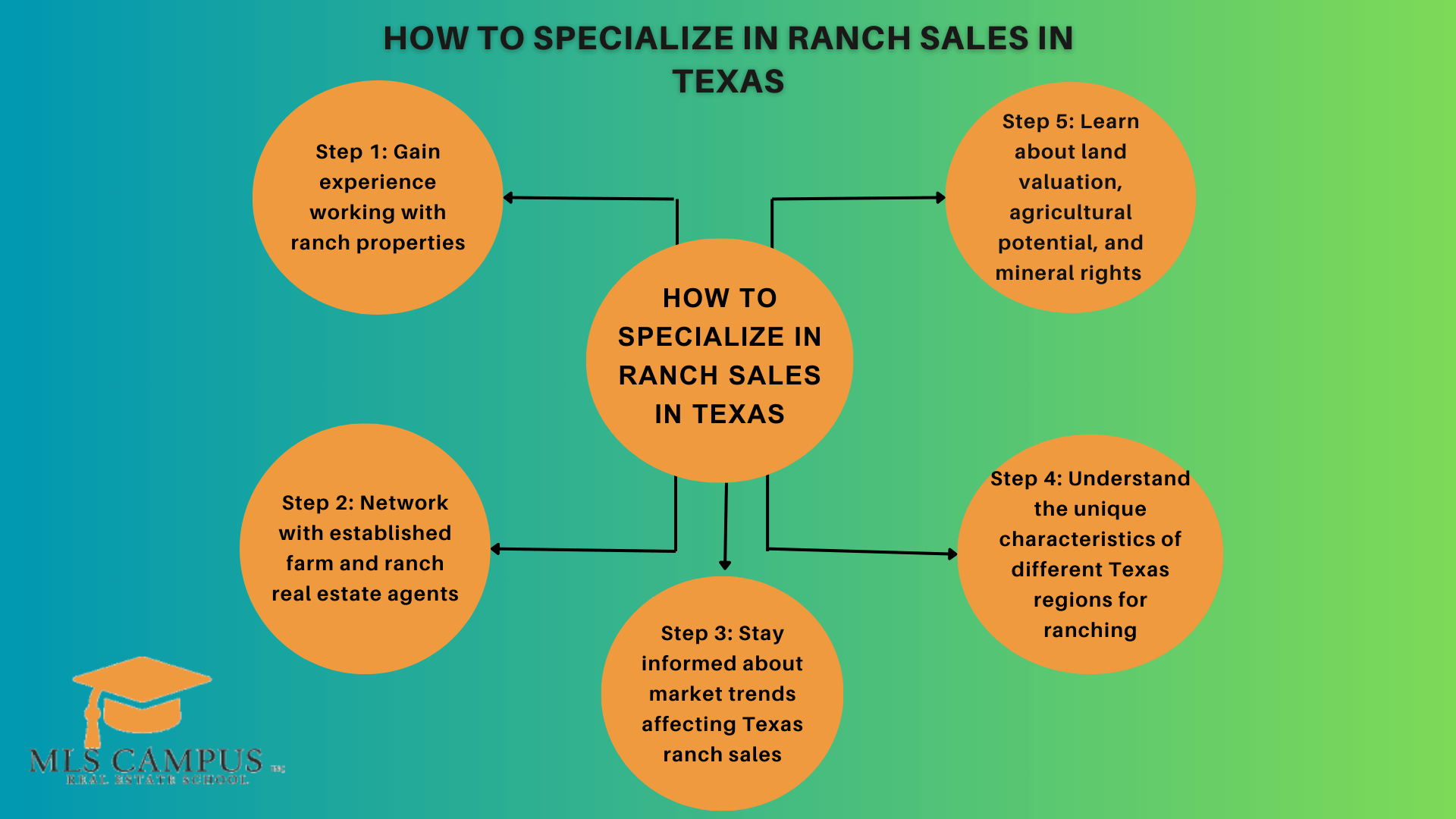How to Specialize in Ranch Sales in Texas

Embarking on a career in Texas ranch sales offers a rare blend of adventure and opportunity, opening doors to a sector where deep knowledge of land and agriculture meets significant financial rewards. As the vast landscapes of Texas call for specialized expertise in everything from agricultural potential to legal intricacies, mastering ranch sales not only boosts your professional credibility but also elevates your earning potential. Whether you’re drawn to the rugged beauty of Texas ranches or the strategic business of land transactions, specializing in this niche can be a transformative career move. Discover the steps and insights that pave the way to success in one of real estate’s most prestigious and profitable arenas.
Becoming a Specialist in Texas Ranch Sales
Why Specialize in Ranch Sales?
Specializing in ranch sales allows agents to tap into a high-value market with substantial commission potential. Texas ranches often sell for millions of dollars, making each transaction significant for both the agent and the client. Understanding the unique characteristics of ranch properties—such as their agricultural value, wildlife potential, and recreational opportunities—is crucial for success in this niche. Moreover, agents who specialize can build a reputation as experts in the field, which can lead to referrals and repeat business.
How to Become a Texas Ranch Sales Agent
To effectively specialize in Texas ranch sales, agents should follow these steps:
Step 1: Get Licensed:
- Complete your education and pass your state exam
- Activate your license by finding a sponsoring broker
- Read our guide – How to Get a Texas Real Estate License!
Step 2: Specialize in Ranch Sales:
- Gain experience working with ranch properties
- Network with established farm and ranch real estate agents
- Stay informed about market trends affecting Texas ranch sales
Step 3: Develop Expertise in Ranch-Specific Areas:
- Learn about land valuation, agricultural potential, and mineral rights
- Understand the unique characteristics of different Texas regions for ranching
Step 4: Continue Education:
- Complete 90 hours of Sales Apprentice Education (SAE) within two years of licensing
- Stick to your license renewal deadlines by completing CE courses
- Attend training events to keep up to date with the latest trends
Understand Texas Ranch Sales
How to Sell a Ranch in Texas
Prepare Your Ranch for Market
Selling a Texas ranch requires meticulous preparation and strategic planning. Before listing your property, comprehensive property maintenance is crucial. This involves thoroughly inspecting and repairing all structural elements, including barns, fencing, gates, and access roads. Potential buyers will scrutinize every detail, so ensuring the ranch appears well-maintained and functional can significantly impact its marketability.
Documentation and Property Valuation
Successful ranch sales begin with comprehensive documentation. Gather all critical records, including deed documentation, title insurance policies, property surveys, and agricultural performance histories. These documents provide potential buyers with transparency and confidence in the property’s value and potential. Professional appraisers specializing in ranch properties can provide accurate valuations considering unique factors like water rights, mineral potential, and regional land use trends.
Pricing Strategy
Pricing a Texas ranch requires deep market understanding. In 2024, ranch property values vary dramatically across regions, ranging from $1,710 per acre in the Panhandle to $9,436 per acre in the Gulf Coast-Brazos Bottom region. Factors influencing pricing include water availability, soil quality, mineral rights, existing infrastructure, and potential income streams from agricultural or recreational uses.
Market Your Ranch Property
Effective marketing goes beyond traditional real estate listings. Create comprehensive marketing materials that showcase the ranch’s unique attributes. High-quality professional photography, drone footage, and detailed property descriptions highlighting recreational opportunities, agricultural potential, and distinctive landscape features can attract serious buyers. Utilize specialized real estate platforms targeting ranch and land investors, and consider working with agents experienced in ranch sales.
Legal Considerations and Negotiations
Ranch sales involve complex legal considerations unique to Texas property laws. Clearly define and communicate water rights, mineral rights, and any existing leases or easements. Potential buyers will conduct thorough due diligence, so transparency is key. Be prepared to provide detailed information about property boundaries, land use restrictions, and any environmental considerations.
Close the Transaction
The final stages of a ranch sale require careful navigation of legal and financial complexities. Work closely with real estate professionals who understand the intricacies of ranch transactions. This includes verifying all documentation, negotiating terms, and ensuring a smooth transfer of ownership. Consider engaging a real estate attorney specializing in land transactions to protect your interests.
Recommended Professional Support
Given the complexity of ranch sales, consider assembling a team of professionals including:
- Specialized ranch real estate agents
- Professional appraisers
- Real estate attorneys
- Land surveyors
- Agricultural consultants
Their expertise can streamline the sales process and help you achieve the best possible outcome for your Texas ranch property.
What is Required to Sell Land in Texas?
When selling land in Texas, agents must adhere to specific legal disclosures and procedures. This includes providing clear information about property boundaries, any existing liens or encumbrances, and ensuring that all necessary permits are obtained for land use changes.
What Part of Texas is Best for Ranching?
Texas offers diverse regions suitable for ranching, each with unique characteristics that cater to different ranching needs. Several areas stand out as particularly well-suited for ranching:
- South Texas: This region is known for its vast ranches and is particularly well-suited for cattle operations. The area stretching from the Lower Rio Grande Valley to San Antonio, Corpus Christi, and Laredo offers extensive grazing lands and a climate conducive to year-round cattle raising.
- Texas Hill Country: Located at the crossroads of West, Central, and South Texas, the Hill Country features gently rolling to hilly grasslands and various canyon formations. This picturesque region is ideal for diverse ranching operations, including cattle, goat, and sheep ranching.
- Central Texas: This area is characterized by rolling grasslands and cross timbers areas with hardwood trees. The fertile soils make it suitable for both farming and ranching, with thriving cattle, goat, and sheep industries.
- West Texas: While more challenging due to its varied terrain and drier climate, West Texas offers unique ranching opportunities. The region’s diverse habitats range from desert valleys to wooded mountain slopes, supporting different types of livestock and ranching operations.
- Gulf Coast Region: Areas around Houston are particularly noted for raising Brahman cattle, which are well-adapted to the warm, humid climate.
The “best” region for ranching can vary depending on specific needs, such as the type of livestock, available resources, and personal preferences. Each region of Texas offers unique advantages for different ranching operations.
How Many Acres Do You Need to Be a Ranch in Texas?
While there is no strict definition of what constitutes a ranch in Texas, properties typically start at around 10 acres. However, many buyers seek larger parcels—often exceeding 50 acres—to qualify for agricultural tax benefits.
Mineral Rights in Texas: What Every Ranch Sales Agent Should Know
In Texas, mineral rights refer to the ownership of the minerals beneath the surface of a property, including oil, gas, and other natural resources. These rights can be separated from the surface rights, meaning that a landowner can sell or lease the surface of their property while retaining ownership of the minerals below.
- Producing vs. Non-Producing Rights:
- Producing Mineral Rights: If a ranch has producing mineral rights—meaning there are active wells extracting oil or gas—these rights can dramatically increase the property’s value. Producing minerals can be valued at $25,000 per acre or more, depending on the volume of production and current market conditions.
- Non-Producing Mineral Rights: Conversely, non-producing mineral rights generally have a much lower value, often ranging from $0 to $250 per acre. They may not generate any immediate revenue, making them less attractive to buyers.
- Location and Geology: The location of a ranch plays a critical role in determining the value of its mineral rights. Areas rich in oil and gas reserves, such as the Permian Basin or Eagle Ford Shale, command higher prices for mineral rights due to their production potential. The geological features of a location can also influence how easily minerals can be extracted.
- Market Conditions: The value of mineral rights is closely tied to fluctuating oil and gas prices. When prices are high, mineral rights gain value as operators are more likely to invest in extraction. Conversely, during price downturns, the value may diminish as operators cut back on production.
- Well Production: The productivity of existing wells is another factor that enhances mineral rights value. A ranch with multiple productive wells will generally have higher-valued mineral rights compared to one with few or no active wells.
- Lease Terms: The terms of any existing leases for mineral extraction can impact value as well. Favorable lease agreements that allow for additional drilling or production enhancements can increase the overall worth of the mineral rights associated with a ranch.
How Much Does a Ranch Owner Make in Texas?
Ranch owners can earn income through various avenues, such as cattle ranching, hunting leases, or agritourism ventures. Understanding these revenue streams allows agents to provide valuable insights into profitability when advising clients on potential purchases.
Ranch owner income in Texas varies widely based on several factors, here is some insights into potential earnings:
- Hourly Rate: As of January 2025, the average hourly pay for a ranch owner in Texas is $38.61. However, this can range from as low as $16.83 to as high as $131.91 per hour.
- Annual Salary: While specific data for ranch owners is limited, related positions offer some context:
- Ranch managers in Texas earn an average of $82,441 annually.
- An owner/manager at Terlingua Ranch Lodge in Texas makes approximately $86,621 per year, which is 18% above the national average.
- Cattle Rancher Income: Although not specific to Texas, cattle ranchers in the U.S. earn an average of $100,977 annually, with salaries ranging from $44,911 to $458,8831.
It’s important to note that ranch owner income can be influenced by factors such as:
- Ranch size and location
- Type of operations (cattle, crops, tourism, etc.)
- Market conditions
- Management practices
Additionally, ranch owners often have significant overhead costs and may reinvest profits into the property, which can affect their take-home pay. The income can also fluctuate year to year due to factors like weather conditions and market prices.
Do Ranchers Pay Taxes in Texas?
Yes, ranchers in Texas do pay taxes, but they are eligible for several tax benefits and exemptions that can significantly reduce their tax burden. Ranchers pay local and state taxes like other property owners and businesses. However, they have access to specific exemptions and special valuations:
- Agricultural Exemption: This is actually a special valuation method where property taxes are calculated based on the land’s productive agricultural value rather than its market value. To qualify, the land must have been used for agricultural purposes for at least 5 of the last 7 years and meet county-specific requirements.
- Sales Tax Exemptions: Ranchers are exempt from paying state and local sales taxes on agricultural-related products they buy and sell.
- Fuel Tax Exemptions: There are exemptions from fuel taxes for agricultural use.
- Franchise Tax Exemptions: Ranches organized as corporations may be exempt from the state’s franchise tax if their tax liability is under $1,000 and gross sales are under $1,000,000.
- Property Tax Reductions: The agricultural exemption can lead to significant property tax savings, as taxes are based on the land’s agricultural productivity value rather than market value.
- Wildlife Management Exemption: This is an alternative to the agricultural exemption that can also provide property tax benefits.
These exemptions and special valuations are designed to support and preserve agricultural activities in Texas. They require meeting specific criteria, which may vary by county. Ranchers should consult with local tax authorities or agricultural extension offices for detailed information on qualifying for these tax benefits
Texas Land Realtor Salary: How Much Do Ranch Sales Agents Make?
Salaries for ranch sales agents vary widely based on experience level, geographic location, and transaction types handled. Successful agents can earn substantial commissions on high-value transactions; thus, building a robust client base is essential for maximizing earnings.
Land agents in Texas earn an average annual salary of $141,649 as of January 2025, with top earners making over $190,000 in some cases. This figure likely applies to more experienced professionals in the field. For real estate agents in general, salaries in Texas show a wide range:
- The average annual salary for real estate agents in Texas is $94,987 or $45.67 per hour.
- Entry-level positions start around $75,000 per year, while experienced agents can earn significantly more.
- In the Dallas-Fort Worth area, the estimated total pay for a real estate agent is $219,942 per year, with an average base salary of $140,449.
Ranch sales agents specializing in high-value properties may earn even more, as commissions on multi-million dollar ranch sales can be substantial. For example, a $12,000 commission could be earned on a $400,000 property sale1. Factors influencing earnings include:
- Location: Urban areas and regions with high property values typically offer greater earning potential.
- Experience: More experienced agents often command higher commissions and have established networks.
- Market conditions: Economic cycles and local market trends can significantly impact transaction volumes and property values.
Building a Career in Premier Texas Ranch Sales
Successful ranch sales agents leverage effective marketing strategies alongside strong industry relationships. Continuous professional development through workshops and mentorship from industry leaders is vital for career advancement. Engaging with organizations like the Texas Association of Realtors can enhance credibility and networking opportunities within the field.
Mastering the Texas Ranch Sales Market: A Path to Success
Specializing in Texas ranch sales offers real estate professionals a unique and potentially lucrative niche. Success in this field hinges on developing a deep understanding of the multifaceted aspects of ranch properties, from agricultural potential to mineral rights. By cultivating expertise in land valuation, market trends, and the legal intricacies specific to ranch transactions, agents can provide invaluable guidance to their clients. This specialized knowledge enhances an agent’s credibility and enables them to navigate complex negotiations confidently. As the Texas ranch market continues to evolve, those who commit to ongoing education and relationship-building within the industry will be best positioned to thrive. Ultimately, a career in Texas ranch sales promises not just financial rewards, but the satisfaction of playing a crucial role in preserving and transferring a vital part of Texas heritage.
Start Your Journey in Texas Ranch Sales with MLS Campus!
Are you ready to embark on a rewarding career in Texas ranch sales? To become a licensed real estate agent in Texas, you need to complete 180 hours of pre-license education, which is a crucial step in your journey. At MLS Campus, we offer a comprehensive 180-hour course package designed specifically to meet the requirements set by the Texas Real Estate Commission (TREC).
Why Choose MLS Campus?
MLS Campus offers an exceptional learning experience tailored to aspiring real estate professionals. Here’s what sets us apart:
- Expert Instruction: Learn from knowledgeable instructors dedicated to your success. Our team is here to answer questions and provide support throughout your studies.
- Flexible Online Learning: Study at your own pace with fully online courses, including audio lectures and interactive tools for an engaging learning experience.
- TREC-Approved Curriculum: Our courses meet all TREC requirements, ensuring a seamless path to obtaining your real estate license.
Take the First Step Toward Your Real Estate Career
Don’t wait to achieve your dreams! Enroll in MLS Campus today and take the first step toward obtaining your real estate license. With our expert guidance and resources, you’ll be equipped to navigate the complexities of Texas ranch sales and build a successful career in real estate.
30 Days Limited Money Back Guarantee Policy
If you decide you’re not 100% satisfied within the First 30 Days of your initial purchase, simply contact us by email and request a cancellation and full refund. You will receive a full refund of your purchase price. If the final exam has been taken, a refund can not be issued. The Real Estate Exam Prep Master and the Exam Prep Math, if purchased separately are not refundable.
Course Duration
The course is active for six months from the date of purchase. We offer the 7th month for free if needed. If your course has been active for 7 months or more, you can purchase one-month extensions. It is possible to have the course extended by up to one year by purchasing monthly extensions online.
Customer Support: Call us at (877) 331-6235 or Contact us by Email
If we can assist you with Technical Support, General License Inquiries or Questions about Course Material please contact us.
Questions about course material: An Instructor is available Monday through Friday a week from 9 am to 7 pm (EST)
Technical Support or any other questions: Our office staff are available Monday through Friday a week from 9 am to 7 pm (EST)
We do our best to reply promptly to emails on Weekends
*Except for Major Holidays
Join Over 100,000 Students Enroll With MLS Campus now
Become Part of MLS Campus School to Further Your Career.












